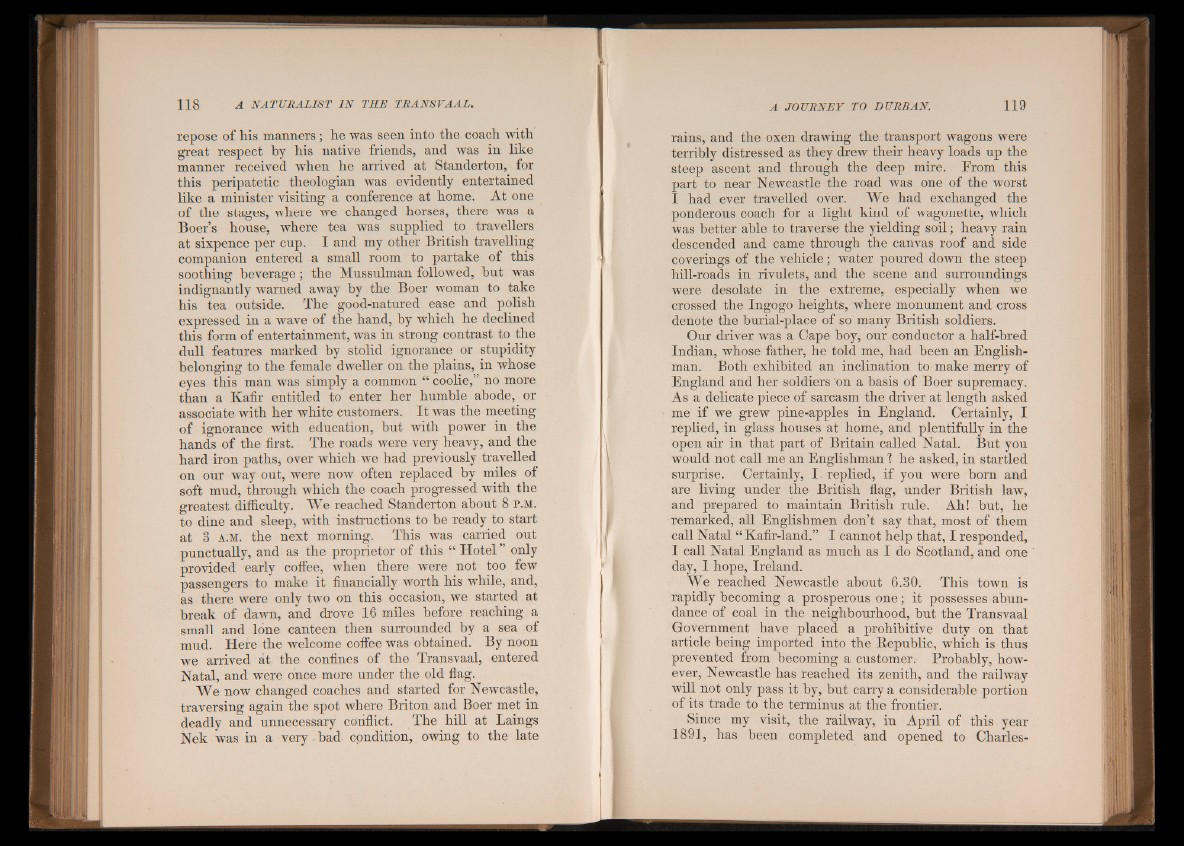
repose of his manners; he was seen into the coach with
great respect by his native friends, and was in like
manner received when he arrived at Standerton, for
this peripatetic theologian was evidently entertained
like a minister visiting a conference at home. At one
of the stages, where we changed horses, there was a
Boer’s house, where tea was supplied to travellers
at sixpence per cup. I and my other British travelling
companion entered a small room to partake of this
soothing beverage; the Mussulman followed, but was
indignantly warned away by the Boer woman to take
his tea outside. The good-natured ease and polish
expressed in a wave of the hand, by which he declined
this form of entertainment, was in strong contrast to the
dull features marked by stolid ignorance or stupidity
belonging to the female dweller on the plains, in whose
eyes this man was simply a common “ coolie,” no more
than a Kafir entitled to enter her humble abode, or
associate with her white customers. It was the meeting
of ignorance with education, but with power in the
hands of the first. The roads were very heavy, and the
hard iron paths, over which we had previously travelled
on our way out, were now often replaced by miles of
soft mud, through which the coach progressed with the
greatest, difficulty. We reached Standerton about 8 p .m .
to dine and sleep, with instructions to be ready to start
at 3 a :m . the next morning. This was carried out
punctually, and as the proprietor of this “ Hotel ” only
provided early coffee, when there were not too few
passengers to make it financially worth his while, and,
as there were only two on this occasion, we started at
break of dawn, and drove 16 miles before reaching a
small and lone canteen then surrounded by a sea of
mud. Here the welcome coffee was obtained. By noon
we arrived at the confines of the Transvaal, entered
Natal, and were once more under the old flag.
We now changed coaches and started for Newcastle,
traversing again the spot where Briton and Boer met in
deadly and unnecessary conflict. The hill at Laings
Nek was in a very-bad condition, owing to the late
rains, and the oxen drawing the transport wagons were
terribly distressed as they drew their heavy loads up the
steep ascent and through the deep mire. From this
part to near Newcastle the road was one of the worst
I had ever travelled over. We had exchanged the
ponderous coach for a light kind of wagonette, which
was better able to traverse the yielding soil; heavy rain
descended and came through the canvas roof and side
coverings of the vehicle; water poured down the steep
hill-roads in rivulets, and the scene and surroundings
were desolate in the extreme, especially when we
crossed the Ingogo heights, where monument and cross
denote the burial-place of so many British soldiers.
Our driver was a Cape boy, our conductor a half-bred
Indian, whose father, he told me, had been an Englishman.
Both exhibited an inclination to make merry of
England and her soldiers ‘on a basis of Boer supremacy.
As a delicate piece of sarcasm the driver at length asked
me if we grew pine-apples in England. Certainly, I
replied, in glass houses at home, and plentifully in the
open air in that part of Britain called Natal. But you
would not call me an Englishman 1 he asked, in startled
surprise. Certainly, I. replied, if you were born and
are living under the British flag, under British law,
and prepared to maintain British rule. Ah! but, he
remarked, all Englishmen don’t say that, most of them
call Natal “Kafir-land.” I cannot help that, I responded,
I call Natal England as much as I do Scotland, and one
day, I hope, Ireland.
We reached Newcastle about 6.30. This town is
rapidly becoming a prosperous one; it possesses abundance
of coal in the neighbourhood, but the Transvaal
Government have placed a prohibitive duty on that
article being imported into the Republic, which is thus
prevented from becoming a customer. Probably, however,
Newcastle has reached its zenith, and the railway
will not only pass it by, but carry a considerable portion
of its trade to the terminus at the frontier.
Since my visit, the railway, in April of this year
1891, has been completed and opened to Charles